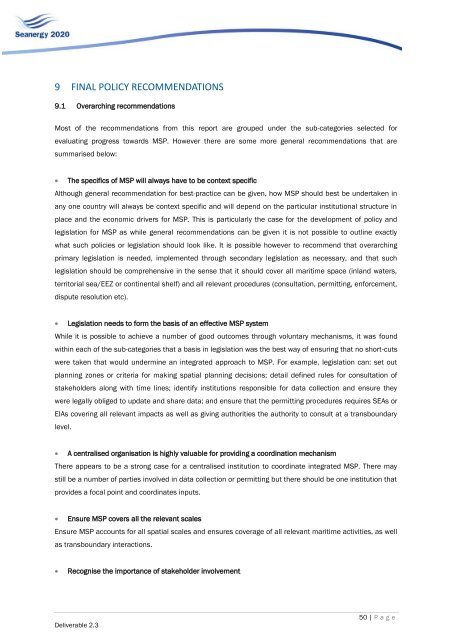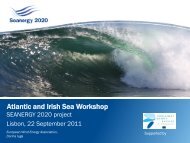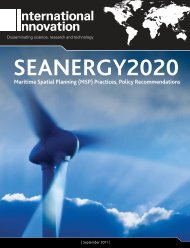Comparative analysis of Maritime Spatial Planning ... - Seanergy 2020
Comparative analysis of Maritime Spatial Planning ... - Seanergy 2020
Comparative analysis of Maritime Spatial Planning ... - Seanergy 2020
You also want an ePaper? Increase the reach of your titles
YUMPU automatically turns print PDFs into web optimized ePapers that Google loves.
9 FINAL POLICY RECOMMENDATIONS9.1 Overarching recommendationsMost <strong>of</strong> the recommendations from this report are grouped under the sub-categories selected forevaluating progress towards MSP. However there are some more general recommendations that aresummarised below: The specifics <strong>of</strong> MSP will always have to be context specificAlthough general recommendation for best-practice can be given, how MSP should best be undertaken inany one country will always be context specific and will depend on the particular institutional structure inplace and the economic drivers for MSP. This is particularly the case for the development <strong>of</strong> policy andlegislation for MSP as while general recommendations can be given it is not possible to outline exactlywhat such policies or legislation should look like. It is possible however to recommend that overarchingprimary legislation is needed, implemented through secondary legislation as necessary, and that suchlegislation should be comprehensive in the sense that it should cover all maritime space (inland waters,territorial sea/EEZ or continental shelf) and all relevant procedures (consultation, permitting, enforcement,dispute resolution etc). Legislation needs to form the basis <strong>of</strong> an effective MSP systemWhile it is possible to achieve a number <strong>of</strong> good outcomes through voluntary mechanisms, it was foundwithin each <strong>of</strong> the sub-categories that a basis in legislation was the best way <strong>of</strong> ensuring that no short-cutswere taken that would undermine an integrated approach to MSP. For example, legislation can: set outplanning zones or criteria for making spatial planning decisions; detail defined rules for consultation <strong>of</strong>stakeholders along with time lines; identify institutions responsible for data collection and ensure theywere legally obliged to update and share data; and ensure that the permitting procedures requires SEAs orEIAs covering all relevant impacts as well as giving authorities the authority to consult at a transboundarylevel. A centralised organisation is highly valuable for providing a coordination mechanismThere appears to be a strong case for a centralised institution to coordinate integrated MSP. There maystill be a number <strong>of</strong> parties involved in data collection or permitting but there should be one institution thatprovides a focal point and coordinates inputs. Ensure MSP covers all the relevant scalesEnsure MSP accounts for all spatial scales and ensures coverage <strong>of</strong> all relevant maritime activities, as wellas transboundary interactions.Recognise the importance <strong>of</strong> stakeholder involvementDeliverable 2.350 | P a g e






